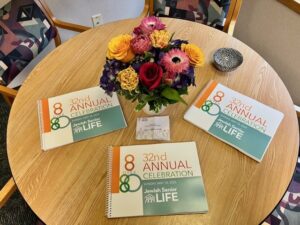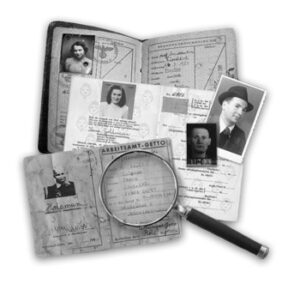REJOICE WITH THE BRIDE AND GROOM
I’m thinking about recent newlyweds Daphna Heisler and Jared Hoffman, whose joyous wedding we celebrated on October 22. On that same day our community turned out to mourn the tragic loss of Samantha Woll z”l’. The circle that was our community at once broken with the horrific news of Sam’s murder, came together in celebration with the bride and groom, something we Jews know is a mitzvah.
Israelis too are going forward with their weddings despite war and loss in their own families. Deborah Danan wrote a beautiful story in the Jewish Telegraphic Agency (JTA) on October 27th reporting on Yonatan Perez, a young IDF soldier who was looking forward to his wedding in 10 days when his world was torn apart. Perez was wounded by gunfire in the October 7 battle with invading Hamas terrorists, near the kibbutz where he was stationed. His brother Daniel went missing in action, his tankmates all dead or abducted by Hamas. Their country was plunged into despair. And yet he stood with his bride Galya Landau under the chuppah as planned on the date set months prior, despite the pain felt by everyone who stood with them.
“It just felt holy,” said Rabbi Doron Perez, Yonatan’s father. “It felt like we’re living in a special time of big things happening … and even though the price has already been so difficult, the overriding feeling was one of happiness, one of just celebration.”
The Perez family’s experience was a version of what many young couples in Israel and all over the world are going through, as they decide whether and how to follow their dreams and plans despite the trail of pain and upheaval left by war, anti-Semitism, and other hateful acts against humanity.
Jewish weddings have a built-in acknowledgment of catastrophe amid joy, symbolized by the breaking of the glass that takes place at the end of the ceremony. Jewish tradition also holds that weddings should go on as planned whenever possible, no matter the circumstances. I think of the 85th anniversary of Kristallnacht November 8. I think of so many other painful moments in history for our people and the struggles of people globally.
Rabbi Perez said, “Unfortunately, I’ve had to learn that it somehow is possible to live with such conflicting, contradictory feelings as deep pain, worry, dread, fear… and at the same time to marry off a son. I have learned that it’s possible to do both. To sort of compartmentalize, and I think I did that at the wedding.”
He said he knows his family isn’t the first to forge ahead in moments of crisis. “I’ve also drawn a lot of strength that throughout the most challenging times, Jewish people got married and had families,” Rabbi Perez said, citing the Holocaust as an example. “We are part of a people that sanctifies life. It’ll be a new dawn and a much better time for the Jewish people going forward.”
And so every day, we think of our Detroit Jewish community. The losses we have suffered in recent months. Our ability to come together to mourn and celebrate our family members, or dance with our sweet residents, or visit our neighbors whom we call friends. We can mourn the lives of others and feel the pain of their families in our hearts. We can stand and feel strong and continue to strive to make a difference. We can act during times of war and stand up for our people and volunteer to help at every opportunity. We can laugh at something absurdly funny in the face of these dangerous times. We can dance joyously with the bride and groom. This moment is all there is.
Shabbat Shalom.









